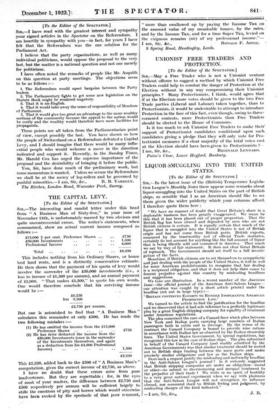LIQUOR-SMUGGLING INTO THE UNITED STATES.
[To the Editor of thi SPECTATOR.] • • Sna,-:--In the latest issue of the (British) Temperance Legisla- tion League's Monthly Notes there appear some remarks about liquor-smuggling into the United•States on the part 'of British ships, so sensible that I as an American should like to see them given the wider publicity which' your columns afford. I therefore quote them here :
" We have no manner of doubt that Great Britain's share in a deplorable business has been greatly exaggerated. We mean by this that it has been placed out of proper proportion. That the British flag has been abused and degraded by men who are not British citizens is certain. It is equally certain that much of the liquor that is smuggled into the United Stales is not of British origin and has not come from British ports. British exports, measured by the trustworthy rod of official Trude statistics, certainly do not account for anything like the full amount of liquor that is being illicitly sold and consumed in America. That much we say by way of fair statement. It does not clear Great Britain of reproach. The Government should set itself to u full investi- gation of the facts. Meantime, if British citizens are to set themselves to sympathetic' and just dealing with the people of the United States, it will be well for some American prohibitionists to recognize that fair dealing is a reciprocal obligation, and that it does not help their cause to foment .prejudice against this country by misleading headlines and suggestions. We take one illustration. In a recent number of the American Issue—the official journal of the American Anti-Saloon. League— our attention was caught by a short article printed under the headline (set out in large type)e—, -
BRITAIN CONTINUES EFFORTS TO RENDER INOPERATIVE AMERICAN
- Pnomairmx
We turned to the article to find the justification for the headline and we discovered that it had sole reference to a perfeetly legitimate plea by a great English shipping company for equality of treatment under American regulations.
The plea concerned the case of a Cunard liner which plies between New York and Italian ports carrying large numbers of Italian passengers both in cabin and in steerage. By the terms of its contract the Cunard Company is bound to provide wine rations in accordance with Italian law as observed by the Italian steamship lines. The United States Government, by special regulations, has recognized this law in the case of Italian ships. The plea submitted in behalf of the Cunard Company (and readily admitted by the American Government) was that similar treatment should be meted out to British ships trading between the same ports and under precisely similar obligations and law as the Italian ships. Does such a request justify the misleading and unfriendly headline in the Anti-Saloon League's journal ? is it seriously suggested that British shipping companies arc under an obligation—moral or other—to submit to discriminating and unequal treatment to the prejudice of their trade I We write in no spirit of hostility to a very great national experiment when we say with plainness that the Anti-Saloon League will not strengthen its influence abroad, nor commend itself to British feeling and judgment, by misleading charges of the kind indicated."


























































 Previous page
Previous page